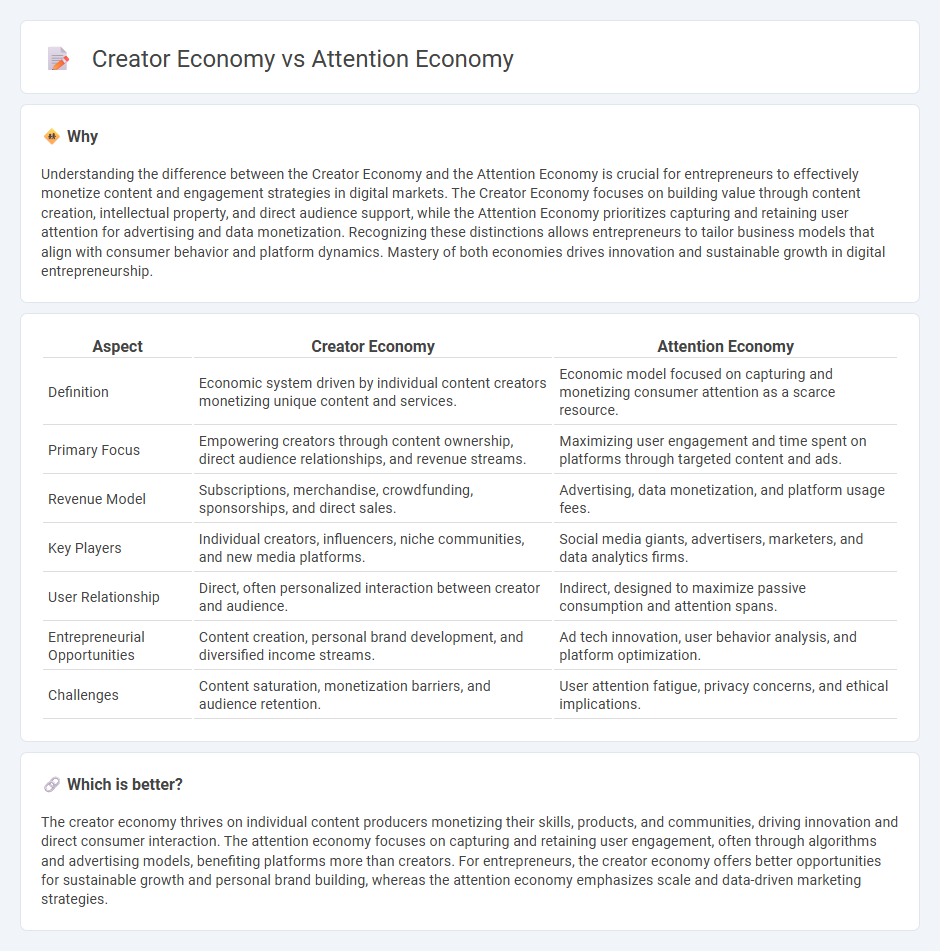
Entrepreneurship within the creator economy focuses on building personal brands and monetizing digital content through platforms like YouTube, TikTok, and Patreon, leveraging direct audience engagement and niche communities. The attention economy emphasizes capturing and retaining human attention as a scarce resource, driving business models based on user interaction metrics and advertising revenue. Explore how entrepreneurs navigate these evolving landscapes to maximize impact and profit.
Why it is important
Understanding the difference between the Creator Economy and the Attention Economy is crucial for entrepreneurs to effectively monetize content and engagement strategies in digital markets. The Creator Economy focuses on building value through content creation, intellectual property, and direct audience support, while the Attention Economy prioritizes capturing and retaining user attention for advertising and data monetization. Recognizing these distinctions allows entrepreneurs to tailor business models that align with consumer behavior and platform dynamics. Mastery of both economies drives innovation and sustainable growth in digital entrepreneurship.
Comparison Table
| Aspect | Creator Economy | Attention Economy |
|---|---|---|
| Definition | Economic system driven by individual content creators monetizing unique content and services. | Economic model focused on capturing and monetizing consumer attention as a scarce resource. |
| Primary Focus | Empowering creators through content ownership, direct audience relationships, and revenue streams. | Maximizing user engagement and time spent on platforms through targeted content and ads. |
| Revenue Model | Subscriptions, merchandise, crowdfunding, sponsorships, and direct sales. | Advertising, data monetization, and platform usage fees. |
| Key Players | Individual creators, influencers, niche communities, and new media platforms. | Social media giants, advertisers, marketers, and data analytics firms. |
| User Relationship | Direct, often personalized interaction between creator and audience. | Indirect, designed to maximize passive consumption and attention spans. |
| Entrepreneurial Opportunities | Content creation, personal brand development, and diversified income streams. | Ad tech innovation, user behavior analysis, and platform optimization. |
| Challenges | Content saturation, monetization barriers, and audience retention. | User attention fatigue, privacy concerns, and ethical implications. |
Which is better?
The creator economy thrives on individual content producers monetizing their skills, products, and communities, driving innovation and direct consumer interaction. The attention economy focuses on capturing and retaining user engagement, often through algorithms and advertising models, benefiting platforms more than creators. For entrepreneurs, the creator economy offers better opportunities for sustainable growth and personal brand building, whereas the attention economy emphasizes scale and data-driven marketing strategies.
Connection
The creator economy thrives by leveraging the attention economy, where content creators monetize audience engagement through platforms driven by user attention metrics. Attention economy principles prioritize capturing viewer focus, enabling creators to build loyal communities and generate income via advertising, sponsorships, and direct support. This symbiotic relationship fuels entrepreneurship by turning creative skills into scalable business models centered around audience retention and interaction.
Key Terms
Monetization
The attention economy thrives by monetizing user engagement through targeted advertising and data-driven strategies, capturing valuable consumer attention across digital platforms. In contrast, the creator economy empowers individual content creators to generate revenue via direct monetization methods such as subscriptions, merchandise sales, and fan contributions. Explore how shifting monetization models are redefining digital ecosystems and creator opportunities.
Audience engagement
The attention economy centers on capturing and retaining audience focus through compelling content and strategic distribution, emphasizing metrics like view duration and click-through rates. The creator economy prioritizes authentic audience engagement by empowering individuals to build communities, foster interactive relationships, and monetize their influence via platforms such as Patreon and TikTok. Explore deeper insights into how these economies shape digital interaction and value creation.
Platform dependency
The attention economy thrives on capturing user engagement through ads, driving platform dependency by controlling content visibility and algorithmic promotion. In contrast, the creator economy decentralizes value creation, enabling creators to monetize directly via subscriptions, merchandise, and sponsorships, reducing reliance on single platforms. Explore how shifting platform dependency impacts creator autonomy and content monetization strategies.
Source and External Links
What Is the Attention Economy? - Coursera - The attention economy describes the marketing and branding strategies companies use to capture and monetize the finite human attention resource amid information overload to drive profitability.
Attention economy - Wikipedia - Attention economy treats human attention as a scarce commodity, applying economic theory to manage information and highlights the value advertisers and platforms place on maximizing user engagement time.
ATTENTION ECONOMY - Welcome to the United Nations - The attention economy is recognized as a new economic factor where digital platforms monetize user attention transformed into personal data, contributing trillions to GDP but also raising concerns about its social impact.
 dowidth.com
dowidth.com